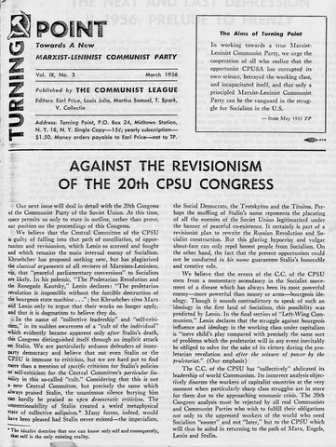
First Published: Turning Point,, Vol. IX, No. 3, March 1956
Transcription, Editing and Markup: Paul Saba
Copyright: This work is in the Public Domain under the Creative Commons Common Deed. You can freely copy, distribute and display this work; as well as make derivative and commercial works. Please credit the Encyclopedia of Anti-Revisionism On-Line as your source, include the url to this work, and note any of the transcribers, editors & proofreaders above.
Our next issue will deal in detail with the 20th Congress of the Communist Party of the Soviet Union. At this time, space permits us only to state in outline, rather than prove, our position on the proceedings of this Congress.
We believe that the Central Committee of the CPSU is guilty of falling into that path of conciliation, of opportunism and revisionism, which Lenin so scorned and fought and which remains the main internal enemy of Socialism. Khrushchev has proposed nothing new, but has plagiarized the classical arguments of all revisers of Marxism-Leninism, viz, that “peaceful parliamentary conversions” to Socialism are likely. In his polemic, “The Proletarian Revolution and the Renegade Kautsky,” Lenin declares: “The proletarian revolution is impossible without the forcible destruction of the bourgeois state machine . . .”; but Khrushchev cites Marx and Lenin only to argue that their works no longer apply, and that it is dogmatism to believe they do.
In the name of “collective leadership” and “self-criticism,” in its sudden awareness of a “cult of the individual” which evidently became apparent only after Stalin’s death, this Congress distinguished itself through an implicit attack on Stalin. We are particularly arduous defenders of inner-party democracy and believe that not even Stalin or the CPSU is immune to criticism, but we are hard put to find more than a mention of specific criticism for Stalin’s policies or self-criticism for the Central Committee’s particular liability in this so-called “cult.” Considering that this is not a new Central Committee, but precisely the same which always praised Stalin, the unanimous silence burying him can hardly be praised as open democratic criticism. The unmentionability of Stalin created a weird metaphysical state of collective solipsism.[1] Many forces, indeed, would have been pleased had Stalin never existed–the imperialists, the Social Democrats, the Trotskyites and the Titoites. Perhaps the muffling of Stalin’s name represents the placating of all the enemies of the Soviet Union legitimatized under the banner of peaceful co-existence. It certainly is part of a revisionist plan to rewrite the Russian Revolution and Socialist construction. But this glaring hypocrisy and vulgar about-face can only repel honest people from Socialism. On the other hand, the fact that the present opportunism could not be conducted in his name guarantees Stalin’s honorable and creative role.
We believe that the errors of the C.C. of the CPSU stem from a momentary ascendancy in the Socialist movement of a disease which has always been its most powerful enemy–more powerful than money or arms–bourgeois ideology. Though it sounds contradictory to speak of such an ideology in the first land of Socialism, this possibility was predicted by Lenin. In the final section of “Left-Wing Communism,” Lenin declares that the struggle against bourgeois influence and ideology in the working class under capitalism is “mere child’s play compared with precisely the same sort of problems which the proletariat will in any event inevitably be obliged to solve for the sake of its victory during the proletarian revolution and after the seizure of power by the proletariat.” (Our emphasis)
The C.C. of the CPSU has “collectively” abdicated its leadership of world Communism. Its incorrect analysis objectively disarms the workers of capitalist countries at the very moment when particularly sharp class struggles are in store for them due to the approaching economic crisis. The 20th Congress analysis must be rejected by all real Communists and Communist Parties who wish to fulfill their obligations not only to the oppressed workers of the world who need Socialism “sooner” and not “later,” but to the CPSU which will thus be aided in returning to the path of Marx, Engels, Lenin and Stalin.
[1] The idealist doctrine that one can know only self and consequently, that self is the only existing reality.